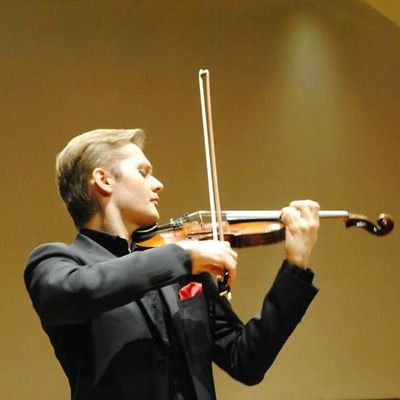Remembering how work started with one of his great students, Prof. Petrushevski recalls first time hearing Jaroslaw Nadrzycki. He was obviously a very strong student with many special qualities that would eventually bring him to the forefront of the music profession. Jaroslaw had many unique qualities that were developed over the years to come, and are now shown in his memorable performances.
All those years ago work started on some technical topics but even more so on the emotional and intellectual side of Jaroslaw’s playing. That aspect of his playing would be given a particular emphasis. Getting fully involved emotionally and showing energy, colors, varied sound and expressing the most intimate feelings was often challenging when combining it with full control of the technical side of his playing. To find the balance within the complexity of both aspects that needed to be present in Jaroslaw’s playing had to be done very carefully. It was like a giant puzzle where if one piece is missing the whole structure falls down.
The intellectual capacity to absorb new information and the willingness to do it was there right from the start. Working with Jaroslaw, Prof. Petrushevski recalls was indeed a great pleasure as working on such a high level allowed it to be of great intellectual and emotional interest.
Recalling the work that was done in a very short period (perhaps even as short as 10 days) on K. Penderecki’s 2nd violin concerto; Jaroslaw came to the lesson bringing the concerto and saying that very soon he had to perform the concerto with K. Penderecki himself conducting with the Simon Bolivar Orchestra. Working on contemporary music had many great challenges; trying to understand exactly what the “Metamorphoses” (the title of the concerto) exactly meant. Apart from understanding all the technical aspects of K. Penderecki’s writings, deeply psychological work began trying to understand the meaning of the music and trying to make it flow through this very substantial work. The ultimate test was of course playing it to the composer and working with maestro Penderecki, which, in Jaroslaw’s words, ‘went very well’. The performance that followed was very memorable. This was then repeated in a tour of Poland with the MDR orchestra and C. Jarvi conducting. Following the huge success of the concert in Venezuela Jaroslaw was invited to perform with the Simon Bolivar Orchestra soon afterwards performing the Beethoven violin concerto.
Remembering working on Beethoven concerto with Jaroslaw Nadrzycki Prof. Petrushevski recalls in particular a very intimate second movement. It was mutually decided that the tempo was to be pulled back therefore allowing in some ways a total freedom of expression. There was a feeling that the music is suspended in the air and that it doesn’t want to end. Working on sound, that is such an important factor in particular in a concerto such as Beethoven’s, where because of the simplicity of structure the musician is completely exposed, was also very fulfilling.
Very different work was done with Jaroslaw on the Khachaturian violin concerto. His obvious technical strength of course helped the work in the first and particularly in the third movements, where the tempo chosen was very fast indeed.The energy that was present during his performance was without any doubt very intense, resulting in the great success of the performance. Working on the second movement however presented different challenges. Armenians are very proud of the huge history and the richness of their culture. Khachaturian reflected many of those aspects in the second movement of his violin concerto. Working with Jaroslaw to be true to his feelings and expressing himself in his unique way but also making the music “sound Armenian” was a very interesting process. The depth of music and in many ways the pain and suffering of the Armenian people combined with their unique folklore was much discussed. Because of the shortness of time the whole concerto was put together quickly. The work was successful resulting in a very strong and memorable performance.
Lots of the work that was done with Jaroslaw had to be done on very short notice which required great power of concentration and extreme technical strength. One of the examples of this was his performance of the Shostakovich 1st concerto. The offer came for Jaroslaw to replace a very prominent violinist who canceled the performance 4 days before the concert. Jaroslaw was asked to step in on a very short notice. He played the concerto many years ago but to play it in four days was very challenging considering the complexity and magnitude of the work. The work that was done was very intense. Just to make sure that there were no memory lapses was challenging enough. Going through the psychological aspect of the deeply depressing slow movements or indeed the horrors of the ‘knock on the door’ in the cadenza was a very memorable experience. The performance was once again very successful especially considering the shortness of time that was given to prepare for the concert.

